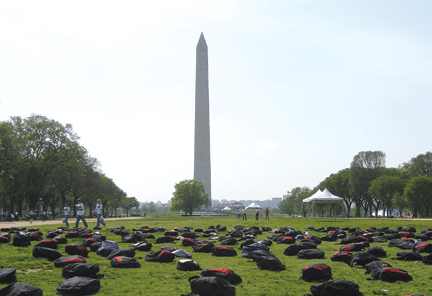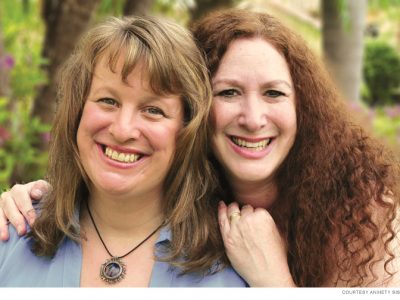
Class of ’03 | When Active Minds held its fifth annual Mental Health on Campus Conference this year at Penn, it began with a somber but powerful display of 1,100 backpacks—one for each of the college students who die by their own hand every year.
For Alison Malmon C’03, Active Minds’ founder and executive director, that was no empty metaphor. Nine years ago, when she was a freshman at Penn, her brother Brian—a senior at Columbia who had taken a leave of absence—became a member of that tragic fraternity.
“While in college he had been dealing with serious depression as well as psychosis, but didn’t feel comfortable telling anybody,” says Malmon. “He kept everything from us, his family, until he finally sought help at the counseling center at his school.” Though he had begun intensive treatment while living at home in Potomac, Maryland, by then it was too late. “My feeling is that he had dealt with these issues for so long, and felt so alone, that in March of my freshman year, he took his own life.”
Out of that terrible event came Active Minds, which Malmon founded during her junior year and which now has more than 170 student-run chapters on campuses across the United States and Canada. It is, in the words of its literature, the only national organization “dedicated to utilizing the student voice to raise mental-health awareness on college campuses.” Given that “almost half of all college students report having felt so depressed they could not function in the past year,” the presence of Active Minds chapters on campuses is “critical to ensure the well-being of their universities’ student bodies,” Malmon notes. “Brian’s story is not unique. Brian could have been me.”
Though she was planning to major in psychology and sociology before Brian killed himself, in the wake of his death, her research took on a personal urgency. She soon discovered “that the high-school and college age is the age when most of these mental-health disorders first present.” (For more on that, see “Youth, Interrupted,” Sept|Oct 2007.)
After joining a grief-and-loss support group at Penn’s Counseling and Psychological Services (CAPS), she began exploring the possibility of creating some sort of student group that could help raise mental-health awareness on Penn’s campus.
“I came back to campus at the start of my junior year, walked into the Office of Student Life, sat down in [associate director] Rodney Robinson’s office, and said, ‘I want to start a student group here—what do I do?’” she recalls.
It started small: Of the 45 people who signed up during the Student Activities Fair on Locust Walk, only three, including Malmon, showed up at the first meeting. But through the support of a fraternity and some friends—not to mention Valerie Swain-Cade McCoullum, the vice provost for University life, and then-Penn president Judith Rodin CW’66 Hon’04—the group grew. Soon Kate Hard, a high-school friend of Malmon’s, brought the model to Georgetown University, where she was a student.
“I knew that what was going on on Penn’s campus was much larger than Penn’s campus,” Malmon notes. “I also knew that Brian’s story was much larger than just Brian. But having seen Kate be able to do what she did at Georgetown was really the motivating factor for me, to know that it wasn’t just my story that people were responding to—that this was an issue that really affects students and families across the country, and that this type of education and student advocacy was really needed.”
Shortly after graduating in 2003, Malmon incorporated Active Minds into a 501(c)3 nonprofit. Now it has a presence on 178 college campuses.
“We’ve been able to grow really quickly because of the support of students from around the country, as well as conference-center staff, psychology professors, and other campus personnel,” she says. That growth is also fueled by the urgent need that Active Minds addresses. “We constantly fight the stigma that surrounds mental-health disorders,” Malmon points out. “It’s still scary for a lot of people to say that they’re part of a mental-health organization or to say, ‘I have bipolar disorder,’ and talk about their personal experiences—which is so important and integral to the mission of Active Minds.” But because of the “incredible students, staff, personnel, and other supporters” who have stepped out of their comfort zone to tell their stories, the organization has been able to “promote our mission of awareness and education and support.”
“We are really proud that Active Minds started on Penn’s campus and how far they have come,” says Meeta Kumar, staff psychologist at CAPS. “It provides a platform for students to have a voice regarding mental-health concerns and the ways it affects their lives, and it advocates for their needs and change. The stigma surrounding mental health is powerful and barriers to treatment are very real for many college students. Having student/peer perspectives and stories go a long way in creating awareness, education, reducing stigma, and helping students feel empowered to address their concerns.”
The theme of November’s national conference at Penn was “celebrate the past, create the future,” and it was a success by just about any measure. Some 350 people attended, including students and staff from 74 different colleges and universities from the U.S. and Canada. More than 70 Penn students and staff participated, and the impressive roster of speakers included psychology professors Christopher Peterson and Nansook Park; Lizzie Simon, author of Detour: My Bipolar Road Trip in 4-D; Ross Szabo, director of youth outreach for the National Mental Health Awareness Campaign; and Gregory Eels, president of the Association of University and College Counseling Center Directors.
“We were very pleased to see how much interest and energy [the conference] created among students, faculty, and staff,” says Kumar. “Not only our campus but nationally. We hope to see this continue to grow, and are happy to support these efforts.”
For Malmon, bringing her national organization back to the place where it started was satisfying on multiple levels.
“I will look back on the chapter at Penn as being the place where the organization was able to not only be founded but start flourishing,” she says. “We received such incredible support from the University, as well as the student body, that I knew that this could be something that could happen around the country and around the world.”
—S.H.
Free and confidential services are available to all Penn students through CAPS, including individual counseling, career testing, consultation, crisis intervention, psychiatric services, referrals, groups, and workshops on psychoeducation topics. Appointments can be made by phone (215-898-7021) or in person. For more information visit www.vpul.upenn.edu/caps.




